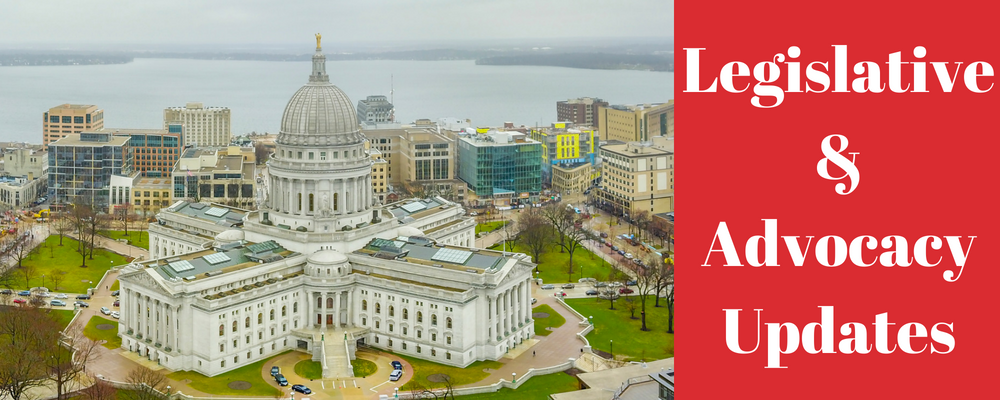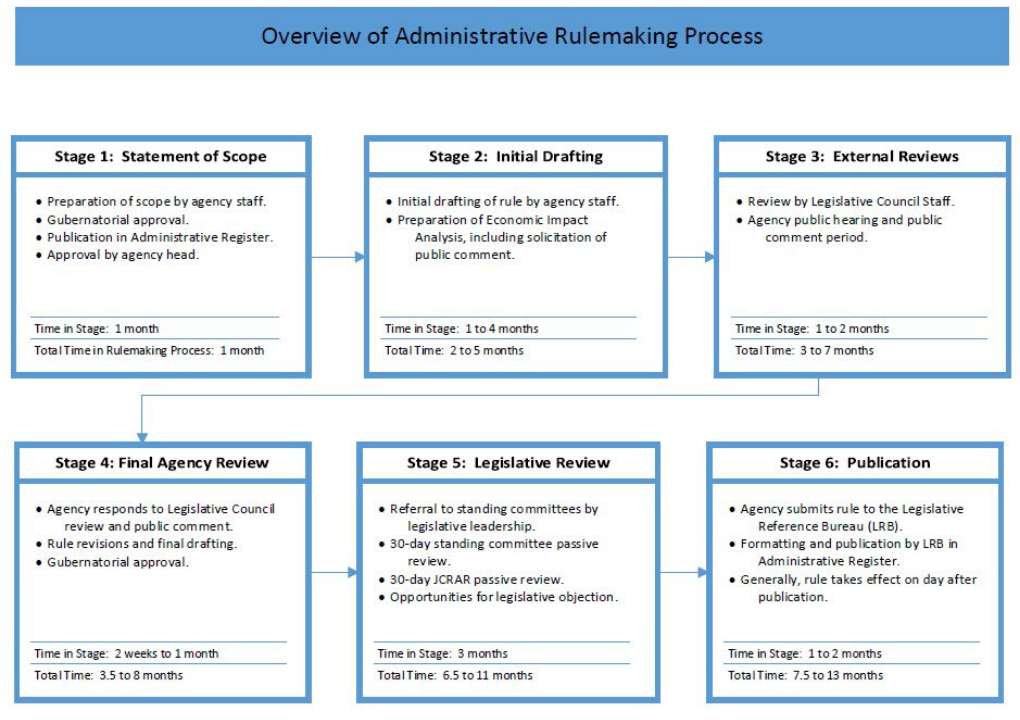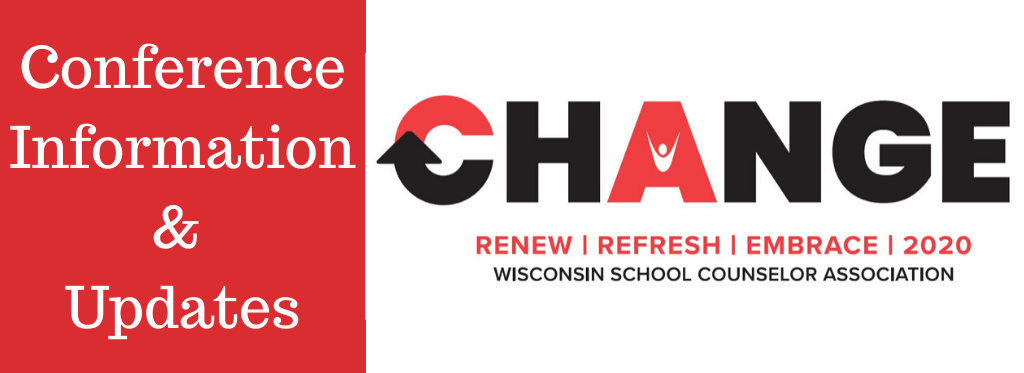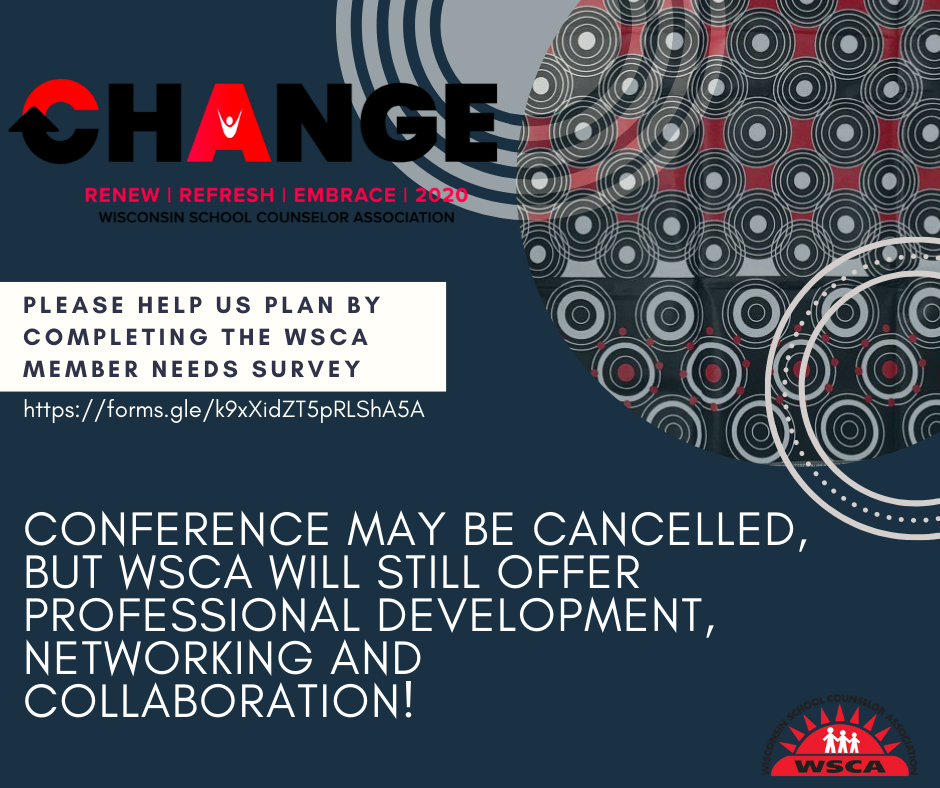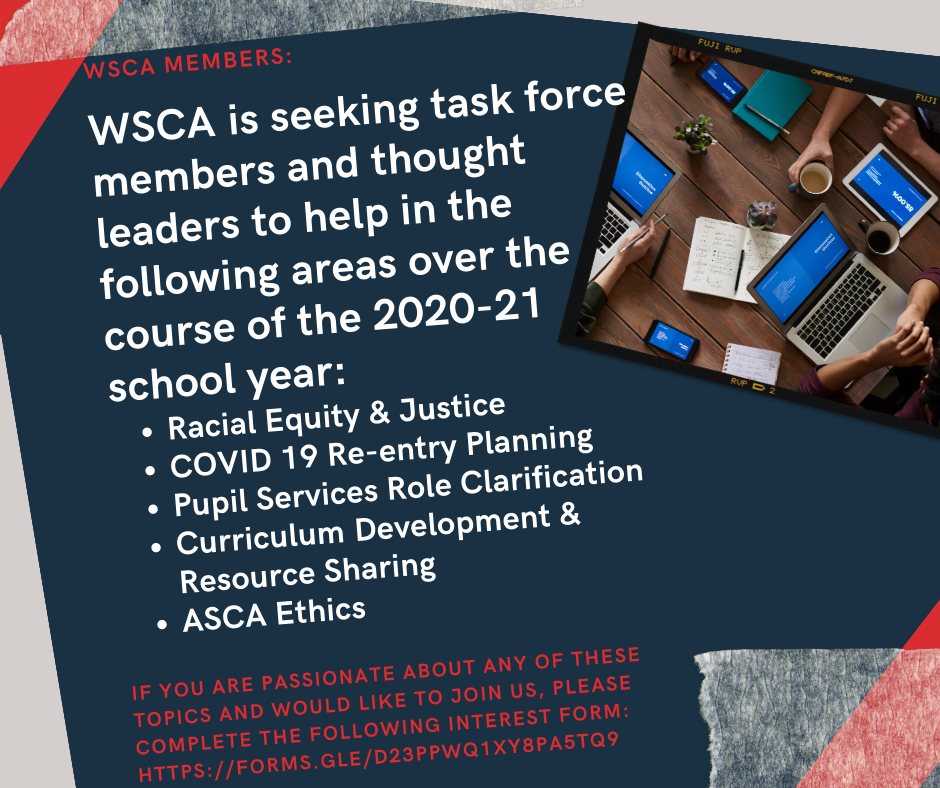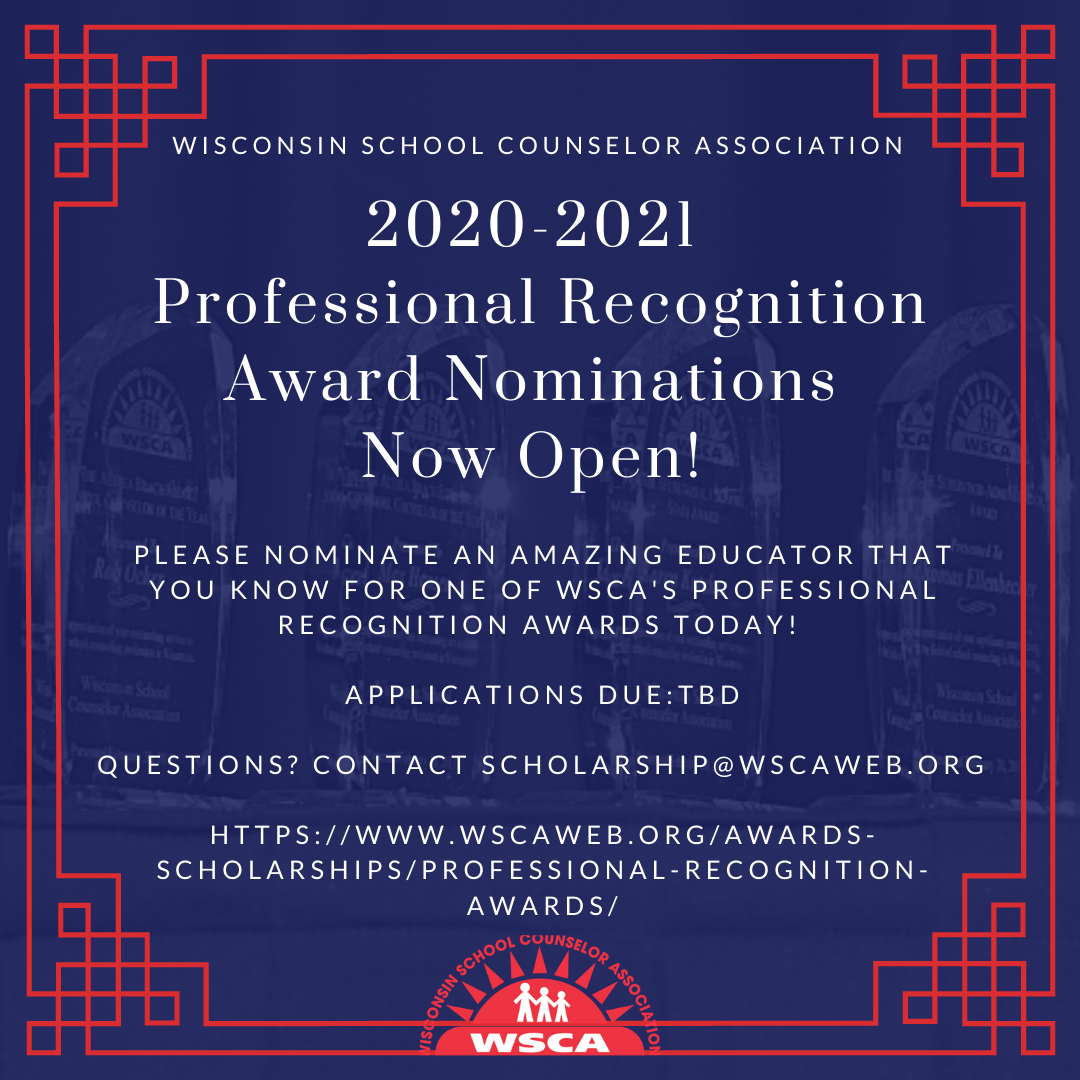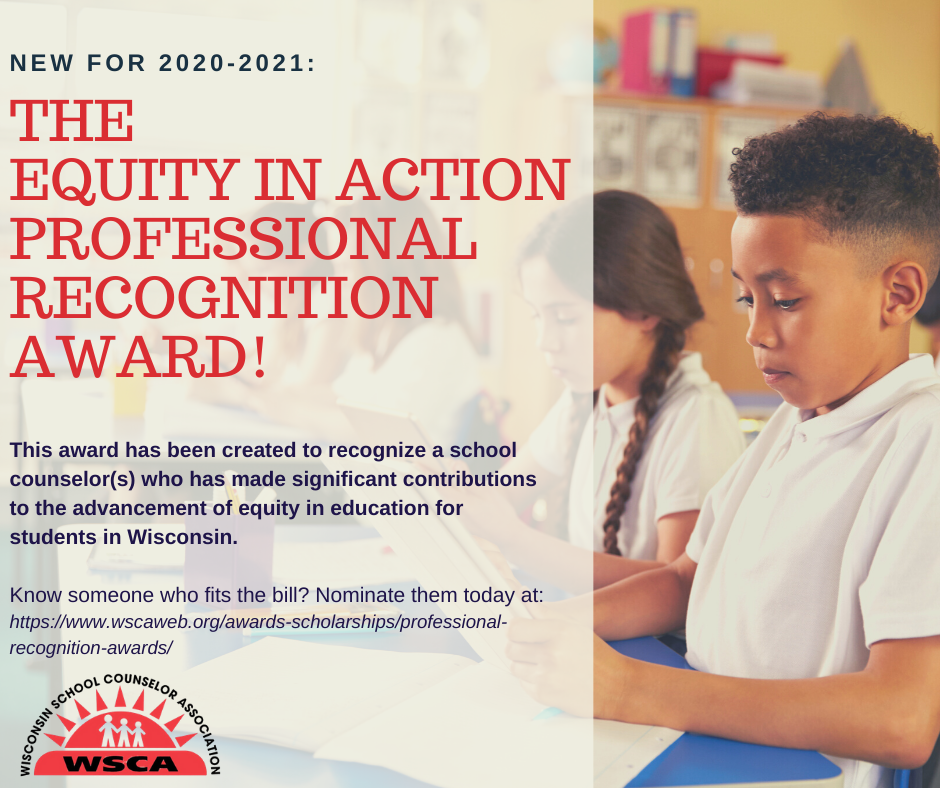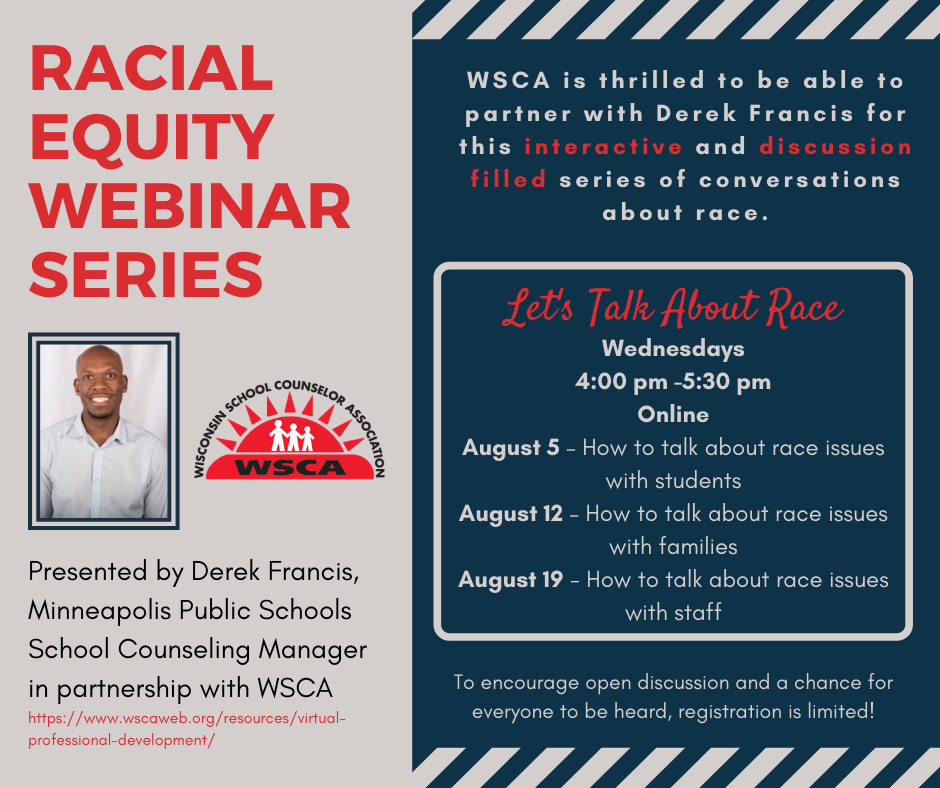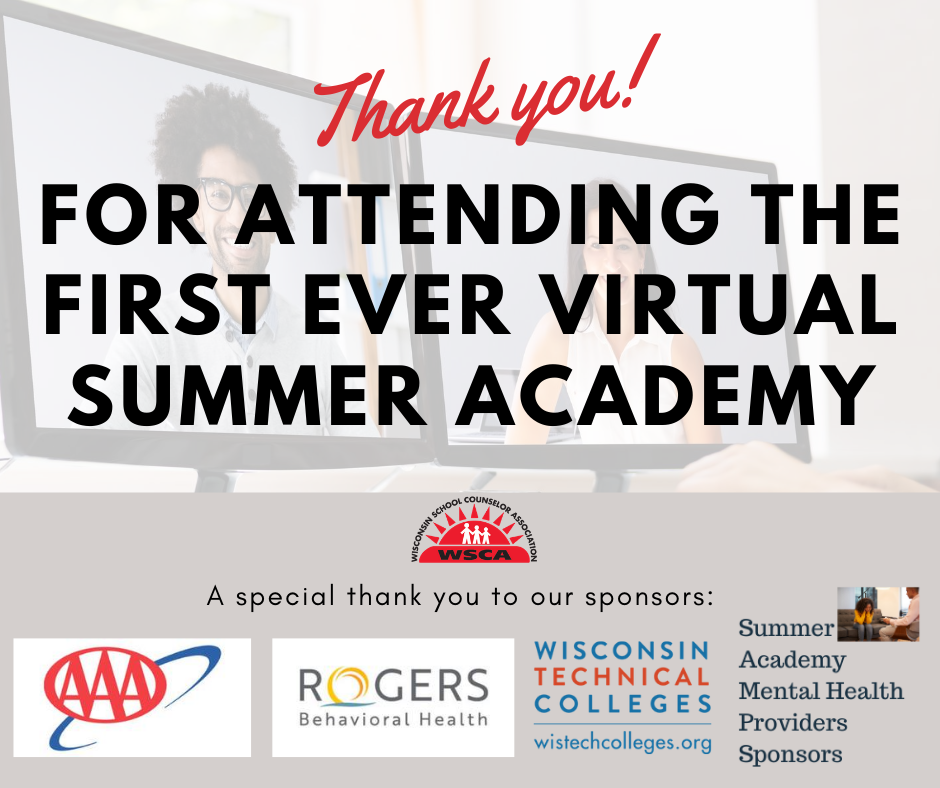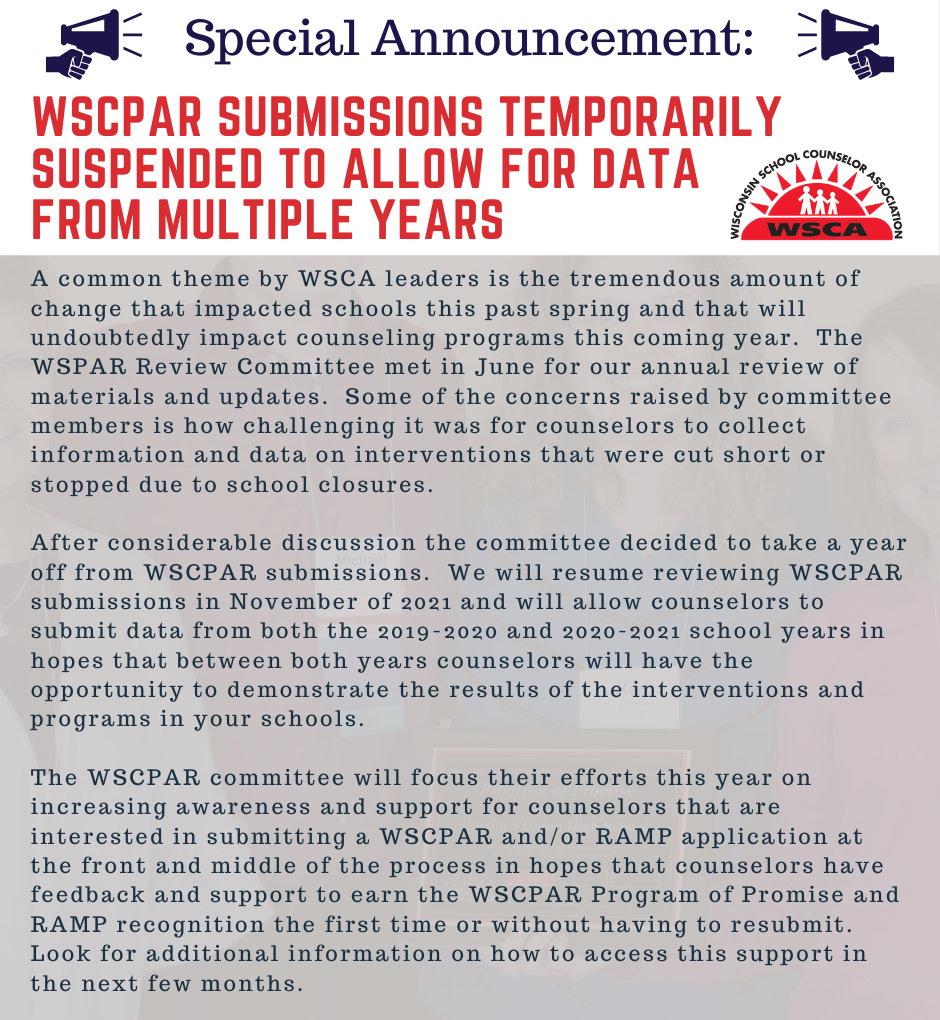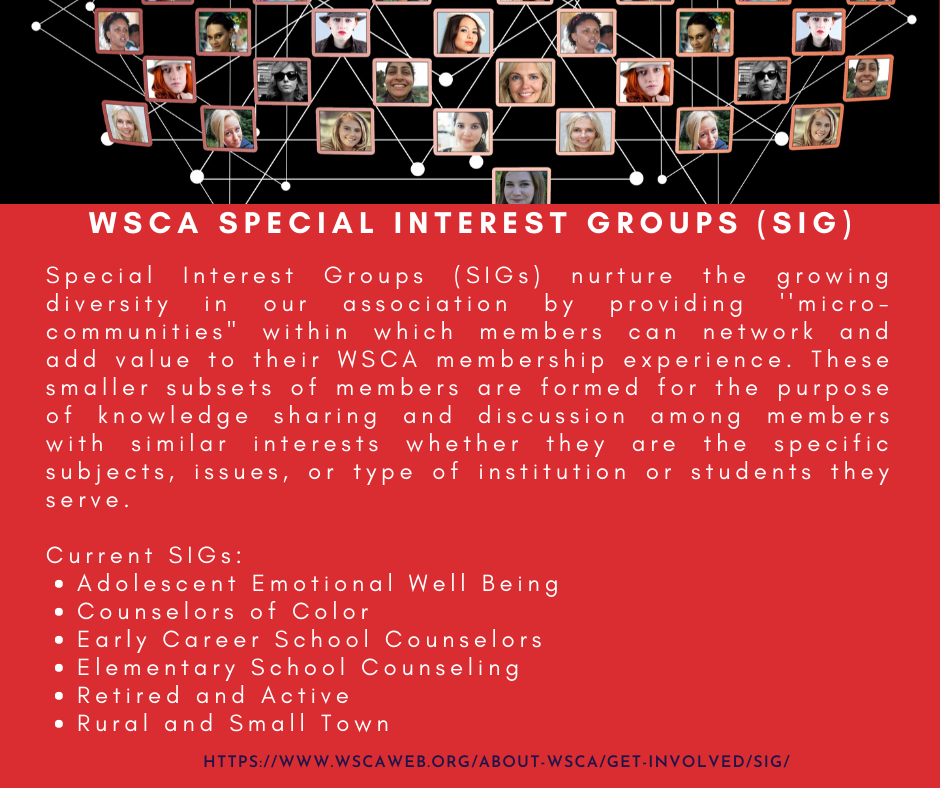August 2020

In This Issue:
- A Message from the Executive Director
- A Message from the Board of Directors
- Special Announcement – 2020-2021 WSCA Conference Cancelled
- Feature Article – Changing Our Ways as School Counselors
- Legislative Update – DPI Proposed Changes to PI 34 Update
- 2020-2021 Conference Updates – Confeence Cancellation Details
- Member Online Learning Needs Survey
- Seeking Members for WSCA Task Forces
- Professional Recognization Nominations Open | New Award: Equity in Action
- Racial Equity Online Learning Opportunity: Lets Talk About Race
- Thank You for Attending Summer Academy
- WSCPAR Temporarily Suspended
- Special Interest Groups
- WSCA Committees Need YOU!
Stacy Eslick, WSCA Executive Director
Dear WSCA members,
Every summer the two WSCA leadership teams (WSCA Board & WSCA Directors of Operations) gather separately to plan for the upcoming year. The WSCA Board works on setting the high level purpose of why WSCA exists (ENDS) and the Directors of Operations then meet to plan on what will be the implementation plan on how to achieve the ENDS. In addition to the formal meetings, I have been meeting with leaders individually and in small groups to prepare, plan and make decisions on behalf of WSCA. What an honor and privilege it is to serve and support such a dedicated group of school counselors giving back so much to the school counseling profession.
As I reflect on the WSCA leadership teams, it reminds me of a leadership principle used frequently in the business community called the “shadow you cast”. The gist of this concept is that organizational leaders must live the values they espouse and walk the talk. Organizations may put out statements of values that read well, however, if they are not owned by and reside in the hearts of the organization leaders, the probability that the organization will live these stated values is low.
WSCA leaders are walking the talk. We want our members to see that our actions are matching our message. As we are working on crafting updates, policies, strategic plans, projects, professional development and the endless other activities to support counselors, know everything we do starts from the heart of our leaders.
While we acknowledge we are not perfect, we continually reflect on how we can best serve you, our members, so you can in turn then best support the students and families in your communities. As we all navigate through continued uncertainty and rapidly changing plans, WSCA will be here for you. Our commitment to being flexible, adaptable and responsive to our members is our top priority.
We appreciate the support WSCA members have shown and continue to show to the school counseling profession. Collectively we can make a difference! Thank you for all you do, it is an honor to be a part of such a great group of professionals. You are truly appreciated and valued.
Stacy
WSCA Board Responses to Book Study on
White Fragility, by Robin DiangeloFor the past year, the WSCA Board of Directors has been having discussions focused on what Equity looks like in education generally, and more specifically in the School Counseling profession. In order to provide excellent leadership for our profession in Wisconsin, the WSCA Board brought in guest speakers to share with us different perspectives on Equity, including Kim Kauki (Executive Director of the Wisconsin Rural Schools Alliance) and Percy Brown (Middleton School District Director of Equity and School Achievement and founder of the Dane County Equity Council).
This summer, to further deepen our understanding of equity from a racial perspective, the WSCA Board undertook a guided study on the book, White Fragility, by Robin Diangelo. The study was led by Jodi Friedman (recently honored as the Culturally Responsive Educator of the Year in 2019 by the Coalition for Educational Justice, and currently serving as a School Ambassador Fellow with the U.S. Dept. of Education). Below are reactions from the WSCA Board members following our book study:
Andrea Donegan:
The WSCA Board book study on equity using the book White Fragility affected me on many levels. First, to be doing equity work with an amazing group of school counselor leaders was incredibly impactful. Collectively, we discovered the many unintended ways that we perpetuate racism through the systems we live and work in. We challenged each other to take action and affect change through our role as human beings, school counselors and Board members for WSCA. Considering how all of the work that we do as school counselors is truly through the lens of equity is both affirming and eye-opening at the same time. Intentional, on-going equity work with a focus on impact, rather than intentions, will serve our students well and ensure a bright future for all of them. We are looking forward to continuing the conversation with each other and with all of you. More to come on this important work!Steve Schneider:
This book study really helped me identify all the defense mechanisms that I (and other white people) use to prevent real change when it comes to addressing systemic racism. It also stirred in me intense feelings of tragedy as I reflected on how the U.S. operates under a rigged system created to prevent People of Color from fully and freely contributing to the whole. This historic (and present!) marginalization of an entire race of people with great minds containing great ideas, and big hearts that can contribute to the healing of a nation that is troubled in so many ways, is a practice that makes us weaker. Through reflection instigated by this book study, I realize that it is one thing to say and believe that we are “Stronger Together!” I must accompany this statement and belief with actions that deconstruct a system based on a belief that we are “Stronger Apart.”Megan Williams:
As a black woman, I appreciated the experience of being joined in the vulnerable space that this book talk created by my fellow board members. As I go through life I have found and continue to find myself in so many spaces where I am the only person of color in the room. One of the most difficult aspects of that experience is being a part of and witnessing the attempt to tiptoe around, ignore, and avoid mentioning the giant elephant that sits smack dab in the middle in each of these spaces: the subject of race. What this experience taught me is that while approaching that elephant might be scary and could cause us some discomfort, it is important for all of us to work together to figure out what to do about the elephant so that we can see each other without the elephant obstructing our view. If we are courageous enough to sit with that discomfort and if we can be willing to learn from one another, these conversations have the potential to unite groups of people, inspiring everyone involved to do their part to make the world a better place for the children and families that we serve.Donna Okray:
Participating in equity work with the WSCA Board through a book study using the book White Fragility with facilitation from Jodi Friedman, a passionate anti-racist educator serving beautiful, smart and curious black and brown elementary students in New York City, was transformational, awe-inspiring, and welcomed. When I began the book study I described myself as “unsettled”, after open, honest and courageous conversations, I was becoming “more comfortable” – More comfortable to talk openly about systemic racism, my beliefs, mindsets and experiences, and the complexity behind White Fragility. For me, this book study was one step in the right direction for continued personal and professional growth. There is so much more for me to learn and reflect upon when it comes to equity, racism and social justice. I am currently reading How to Be an Antiracist by Ibram X. Kendi. Ibram X. Kendi asks us to think about what an antiracist society might look like, and how we can play an active role in building it rather than working with the policies and systems that are in place. I am very blessed to have a group of professionals, WSCA Board and ED, to learn and grow with for the betterment of the beautiful, smart and curious BIPOC students I serve.Tricia Norby:
My biggest takeaways include setting aside my own ego and being open to receive feedback on any missteps I may make in my journey. We were all born into a society with systems and structures in place that advantage white people. Being part of the solution is so much more than acknowledging my own biases and calling out racism when I see it. I need to be actively engaged in dismantling those systems and structures to allow for a more equitable society for all.Amy Everson:
Participating in the book discussion on White Fragility with my fellow board members was an eye opening experience for me. I feel like it took me to a deeper level of understanding on the topic of racism, which is so much more than overt racist behavior. I learned that being anti-racist and pro-black is so much more than having good character, it is being human. I am now aware that racism lives under the surface and is embedded in our society at a deep level. It is my responsibility as a fellow human to be open to feedback on my own mistakes, without defensiveness and to unlearn my own biases and prejudices. Because, it is a loss for all humanity to continue in a racist society.Miriam Brown:
This book study was necessary and important work for our board (a predominantly white space) to engage in together. Too often, white people rely on the emotional labor of BIPOC to educate us on their lived experiences and the systemic injustices encountered daily. This book is written by a white author and is intended for a white audience, and it is an accessible way for white people to grow their knowledge about racism without re-traumatizing or burdening BIPOC colleagues, friends, or family. The book is a call for action for white Americans to understand their racialized identity, build their racial stamina, and dismantle inherently racist structures (education!). Without this knowledge, well-meaning white School Counselors who are good people will continue to (1) unintentionally harm their BIPOC students and (2) raise white students who perpetuate the status quo.Carly Roth:
Our board’s study of White Fragility was a challenging and transformative experience for me. I was particularly surprised that the insight I gained through this book study left me so eager to learn from my mistakes and actively seek ways to disrupt the status quo for BIPOC students. I’ve come to understand that as a white educator, it is my responsibility to actively dismantle systems of racism around me. There is a tremendous amount of work to be done, but the stakes are too high to allow our existing systems to go unchecked.
WSCA 2020-2021 Conference Cancelled
The theme for the November 2020 WSCA conference, “CHANGE”, could not be more apt as we are all struggling with the impact COVID is having on our schools, families and communities. WSCA leaders were so excited to bring the school counselor community together in November at our new conference location, the Kalahari Resort in Wisconsin Dells. The conference team met and after careful deliberation and planning, made the difficult decision to cancel this year’s WSCA Conference. The well-being of our members, families, schools, and communities was paramount to our decision.
We are looking forward to seeing everyone for the 2021 WSCA Conference as scheduled and are grateful to the Kalahari Resorts and Convention Center for working with us. We are also thankful to our conference committee, speakers, exhibitors, and sponsors for your understanding and dedication to the school counseling profession.
COVID-19 has presented us all the opportunity to think, act, and live differently. Our approach to how we define, and balance work and home is forever changed. As a school counseling community, we are here to support each other, serve as an outlet to ask questions, request assistance, and share ideas. WSCA recognizes as educators we are facing another year of uncertainty which will require us to be flexible and adaptable. WSCA continues to be committed to providing high quality training, collaboration and networking opportunities for our members this year and has a leadership team working on what this looks like for 2020-2021. We are asking school counselors to complete the following survey, https://forms.gle/k9xXidZT5pRLShA5A , so we have your input to create a plan that supports members needs.
Thank you for all your hard work, dedication, and heart during these challenging times and your contributions to the WSCA school counselor community.
Gary Cambpell, Paula Haugle, Erin Wood, Andrea Berlin, Rich Miesfeld, Victoria Claas, Stacy Eslick, Nicole Kester
WSCA Conference Team
Changing our Ways as School Counselors
Mindy Willard, School Counseling Coordinator, WSCA Advocacy and Public Relations Director
The world around us has evolved quite a bit since the last time we saw our students. Some might even say, in the wise words of the Fresh Prince of Bel Air, that our “worlds got flipped and turned upside down.” I would argue that this isn’t necessarily a bad thing, particularly when it comes to equitable education. We know that for many of our students their school experience has always felt “upside down”. As much as we’d like to think of school as a safe place for all, we know that this is not the case for many of our students. Thanks to COVID-19 and the Black Lives Matter Movement we can no longer ignore the disparities our students and families have faced for many (hundreds) of years. We are realizing that our well intentioned efforts as educators and school counselors are just not enough and that we must re-examine our hearts and our practices to really impact the lives of EACH of our students.
Closing opportunity gaps (the term we should be using now instead of achievement gaps) for our students is nothing new to school counselors. We’ve been doing this since the early 2000’s when the ASCA National Model came to be. School counselors examine school-wide data, identify discrepancies between populations then develop programming to address that discrepancy. What I recently realized is that so much of the “programming” we develop as school counselors is focused on changing the student. “If I can only teach this student to organize her backpack, then she’ll do well in class.”, “If this student just had a little more grit, she’d be fine in that AP class.”(despite the fact that she’s working after school and taking care of siblings) or how about this one “If this student just knew how to calm down ‘appropriately’, then he wouldn’t get in so much trouble in Mr. Smith’s class.” How often do we as school counselors focus on systemic change rather than student change? Yes, systemic change is nothing new to us…we’ve read all about it in the ASCA Model Books, we know that it is one of the theme’s of the model, but how much systemic change have you really made a school counselor? And who has benefited from that systemic change? Oftentimes, despite our best efforts the students benefiting from our programming aren’t the students who need it most.
One of the best ways to ensure our programming and practices are impacting the students who need it most is to talk to them! Where is the student voice in your counseling program? Have you started an Advisory Council? Do you engage in Learning Partnerships? (see Zaretta Hammond’s Book Culturally Responsive Teaching and the Brain to learn more about Learning Partnerships). Now is a perfect time to do something different than what you’ve always done. In the last several months our students have experienced things many of us could never imagine. They’ve been traumatized repeatedly but they’ve also persevered and triumphed in ways many of us could never imagine. We cannot make assumptions about the experiences our students have had in the last few months. Do what you do best as school counselors and talk to your students and families. Invite them to be a part of your counseling program. Bring the voices of your Black and Brown students, your LGBTQ + students, your Indigenous students, your students with disabilities into your program in a way that maybe you never have before. If you aren’t sure where to start with systemic change in your building, these folks will tell you! Ask questions, listen to their stories and most importantly believe them. Then do something about it! It is your ethical responsibility as a school counselor to not sit by as our education system continues to provide an “upside down” experience for our students.
DPI Proposed Changes to PI 34 Update
In May, WSCA shared information about DPI PI 34’s Scope Statement regarding licensing changes that impact school counselors. WSCA continues to monitor the process closely and wants to share the recent updates along with gathering interest from our members to get involved now so we have a timely coordinated response when needed. The original scope statement can be found here: https://docs.legis.wisconsin.gov/code/scope_statements/all/030_20
The chart below shows the process moving forward regarding the proposed changes to PI 34. WSCA will be asked for feedback and input on the rules revisions at some point in July (the process has been delayed due to DPI needing to redirect resources to school re-entry planning and support). There will also be multiple other opportunities for input into the rules revision process over the next few months.
WSCA needs to hear from you in order to better advocate for our members and school counselors across the state. Your voice matters! If you are interested in providing feedback or even the possibility of sitting at the discussion table with key stakeholders in the future, please fill out this form https://forms.gle/VgFcBhRo5chvQBu36 so we can continue to connect with you and keep you informed as we continue through this process. If you’ve always wanted to get involved but haven’t been sure how – this is a great opportunity to get your foot in the door! We look forward to hearing from you!!
If you have questions or want more information, reach out to Kelly O’Connell, the Government Relations Director, at govrelations@wscaweb.org
~Kelly O’Connell
CONFERENCE REGISTRATION CANCELLATION INFORMATION
All registrations will be cancelled by the WSCA business office and any funds paid via credit card will be refunded 100% back to the original card used. For any registration that was paid by check, a check will be sent to the originator. This will take some time, so please be patient as we work through the cancellation process.
If you do not receive your refund by September 8th, please contact the WSCA business office via email at: admin@wscaweb.orgor call 608.204.9825.
Kalahari Hotel Cancellation
Guests should use the passkey link you used to make your reservation to cancel. After clicking on the link, select manage existing reservation, then enter the confirmation number. Once logged in, you will be able to cancel the reservation. Passkey link: https://book.passkey.com/event/50041183/owner/49796246/home
There will be messaging saying there’s a $25 fee to cancel, however that will not be charged. Each guest canceling will receive a refund of their entire deposit.
If you made your reservation over the phone, you will need to call the Kalahari reservation number to cancel. Reservation number: 877.253.5466
If you made your reservation with another hotel outside of using the passkey, please contact your booked hotel directly.
Per the Kalahari, anyone wishing to keep their reservation or make a new reservation and stay at the group rate may do so at their own discretion, independent of the conference.






